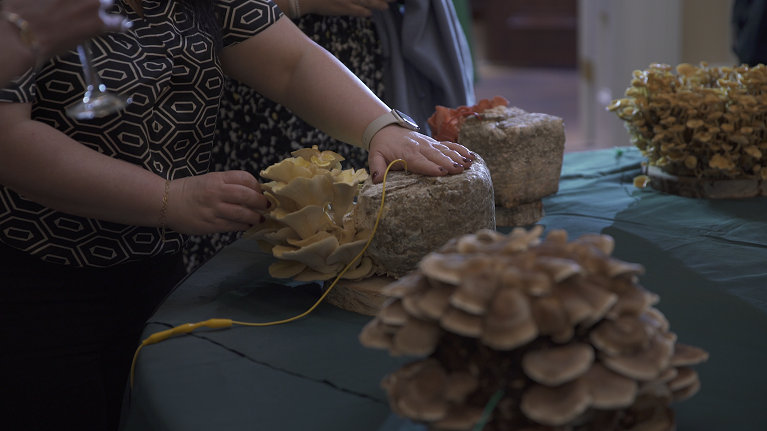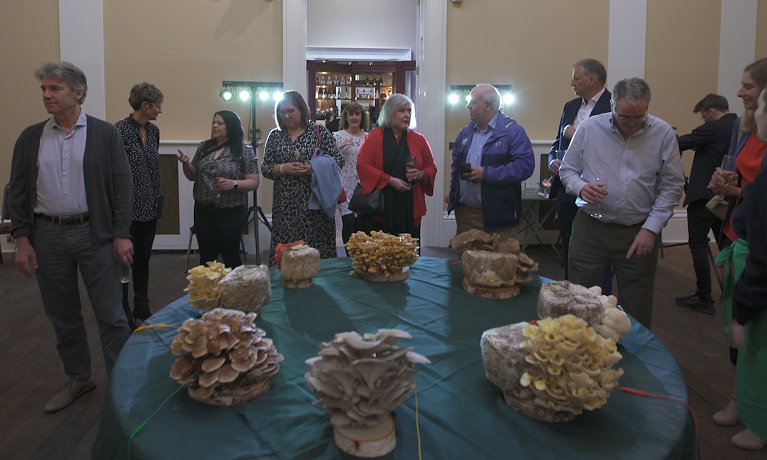By Alessandro Merendino, Maureen Meadows, Scott deLahunta, Nick Henry, Nick McGuigan, Centre for Business in Society
Sent to Coventry
A thought-provoking industry event occurred on May 18th, 2023, at the historical and recently renovated Drapers’ Hall, originally constructed in 1832 and situated on Bayley Lane in the Cathedral Quarter of Coventry. The accounting profession was “Sent to Coventry!” in a business-style dinner organised by academic researchers from Coventry University’s Centre for Business in Society and Monash University (Australia). The evening’s entertainment aimed to explore how arts and performance-based methods could engage and provoke business leaders’ thinking.
The event was part of a bigger project known as Creative Accounting, which brings together an interdisciplinary team, including researchers from the Centre for Business in Society, Centre for Creative Economies, and the Centre for Dance Research (all Coventry University) and Monash University. The team organised the business dinner for eleven senior accountants to discuss two challenging topics in the profession: sustainability and the use of digital technologies.
To encourage meaningful discussions, artists were commissioned to facilitate the evening in a creative, playful and thought-provoking manner. The evening was supported by global professional accounting bodies the Institute of Chartered Accountants England and Wales (ICAEW), the Association of Certified Chartered Accountants (ACCA) and the Certified Institute of Management Accountants (CIMA).
The research team collaborated with Talking Birds, a grass-roots arts organisation based in Coventry and known for its gently provocative projects which explore, and seek to illuminate, the profound and complex relationships between people and place. Talking Birds co-designed, co-led and co-facilitated the discussions on social and ecological responsibility and the use of technology in accounting. The event featured mycelium (mushroom) artist Lisa Franklin’s interactive installation on sustainability, along with illustration artist Camille Aubry providing real-time visual capture and recording.

Prior to the event, all eleven invited accountants undertook research interviews. During the event, the accountants engaged in candid discussions on various professional concerns, with sustainability and digital topics as central themes. The researchers collected data and documentation from the evening, and follow-up interviews with the dinner guests were conducted to gain further insights into their unique experience.
Art Broke Down the Stiffness of Accounting
Feedback from the participants indicated that the integration of thought-provoking experiential and performative artistic elements contributed greatly to important and profound discussions within the accounting profession. The participants agreed that this helped to make the dinner more informal and intimate, yet structured; as one said, “art broke down the stiffness of accounting”. Participants commented on the uniqueness and innovativeness of bringing together two very different practices – artistic and accounting; two disciplines not usually thought of as having much to do with each other.
A Magical Evening
The encounter with mushrooms at the start of the evening was intended to demonstrate a sense of the living connectivity of mycelial systems and sustainability into the conversations, with Franklin’s tactile and interactive sound installation inviting the participants to work together to create a soundscape in the room. This experience clearly made a significant difference to the mood of the event, and its metaphorical novelty on sustainability and holistic practices informed and stimulated the discussion over dinner. Participants reported how it provided a unique experience to ‘report back on’ to others in their work context.
Based on a preliminary analysis of our data, some of the main takeaways from the event are:
- The participants gained more awareness of the topic of sustainability, thanks to the evening’s experiences and reflexive discussion.
- The challenges and opportunities of integration of digitalisation with humans (accountants)
- The event helped to reinforce their existing thinking about new ways of working in the accounting and finance profession. A number of participants commented that the event had given them increased confidence in what they are already doing in their daily job.
- Other participants felt inspired; it was a reminder of other people’s mindsets, and it challenged any reluctance to make changes to improve sustainability practices and reflexive adoption of new technologies.

At a timely and critical juncture in managing global capitalisms, the initial success of this project has led the transdisciplinary research team to commit to: the acceleration of integrative forms of thinking, measurement and value within accounting and finance practice; continued development of interdisciplinary approaches within business and management, social science, and practice-research; and to organise similar future events aimed at fostering creativity, values, and imagination that drive positive change in business and the business leaders of tomorrow, ultimately creating a more prosperous, healthy, sustainable, and secure future for society. The work continues with our accounting body partners and the final report will be issued in January 2024. Stay tuned!
This project has been funded by Coventry University’s Quality-related Research Funding (QR) and the Arts and Humanities Research Council. The research team comprises Dr Alessandro Merendino, Professor Maureen Meadows, Professor Nick Henry and Professor Scott Delahunta (Coventry University), with Professor Nick McGuigan (Monash University, Australia). We are grateful to Talking Birds, Lisa Franklin, Camille Aubry and the accounting bodies ICAEW, ACCA and CIMA.
Through understanding the impact of organisations’ activities, behaviours and policies, the Centre for Business in Society at Coventry University seeks to promote responsibility, to change behaviours, and to achieve better outcomes for economies, societies and the individual.





Comments are disabled